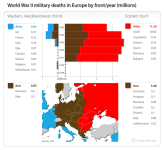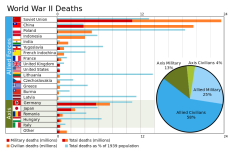Jokodo
Veteran Member
70 years after Nazi Germany was defeated, when we1* think of how the war was won for the allies, we think of D-day, of British and American fighter pilots, maybe of the desert war and the French resistance, and in this context we might even remember the civilian losses of the Blitz in London and other places in the UK.
We1 don't usually think of the Red Army that halted the Axis advance at Stalingrad almost two years before D-day, and was well on its way to Germany proper by mid-'44. We don't think of the partisans in Poland, Yugoslavia, or the occupied parts of the Soviet Union who severely impeded Germany's ability to operate through sabotage. And, at the occasion of the 70th anniversary of the victory, it's anything but easy to find, in English speaking media, even a casual reference to the millions of civilians who were sent to do forced labour for Germany's military-industrial complex from those countries, or the millions who were summarily executed as retaliation for partisan acts (holocaust deaths, the overwhelming majority of which were in the East too, are an honorable exception to this pattern) - while the same media happily report on the savagery of the Blitz and how hard it made life in England.
Even we2* who were on the wrong side in the war sometimes tend to forget why we lost it. While I do have a direct ancestor who died on the Eastern front (my kid has at least two), and while no-one (that I know of - though people tend not to talk about what their ancestors did then) has relatives who died on the Western front, the narrative we heard in history class still is predominantly that the balance shifted once the US entered the war.
So I guess both we1 and we2 are in ample need of a reminder that the Western Front was, relatively, a sideshow, and it's main importance to tie up German troops, thereby hastening the Soviets' advance. The war was, very clearly, won in the East, by Russia.
For illustration, I give you (both via World_War_II_casualties):
World_War_II_casualties):

and

Also, WP's don't forget how the Soviet Union saved the world from Hitler.
In conclusion: Спасибо, Россия - thank you, Russia!
"We1" refers to people who were raised and received their basic education in a Western country, and influenced by Western pop-cultural elaborations on the theme of WW2; we2 refers to people whose ancestors served (and sometimes died) as Axis soldiers, but who are still very happy the war ended the way it did.
We1 don't usually think of the Red Army that halted the Axis advance at Stalingrad almost two years before D-day, and was well on its way to Germany proper by mid-'44. We don't think of the partisans in Poland, Yugoslavia, or the occupied parts of the Soviet Union who severely impeded Germany's ability to operate through sabotage. And, at the occasion of the 70th anniversary of the victory, it's anything but easy to find, in English speaking media, even a casual reference to the millions of civilians who were sent to do forced labour for Germany's military-industrial complex from those countries, or the millions who were summarily executed as retaliation for partisan acts (holocaust deaths, the overwhelming majority of which were in the East too, are an honorable exception to this pattern) - while the same media happily report on the savagery of the Blitz and how hard it made life in England.
Even we2* who were on the wrong side in the war sometimes tend to forget why we lost it. While I do have a direct ancestor who died on the Eastern front (my kid has at least two), and while no-one (that I know of - though people tend not to talk about what their ancestors did then) has relatives who died on the Western front, the narrative we heard in history class still is predominantly that the balance shifted once the US entered the war.
So I guess both we1 and we2 are in ample need of a reminder that the Western Front was, relatively, a sideshow, and it's main importance to tie up German troops, thereby hastening the Soviets' advance. The war was, very clearly, won in the East, by Russia.
For illustration, I give you (both via

and

Also, WP's don't forget how the Soviet Union saved the world from Hitler.
In conclusion: Спасибо, Россия - thank you, Russia!
"We1" refers to people who were raised and received their basic education in a Western country, and influenced by Western pop-cultural elaborations on the theme of WW2; we2 refers to people whose ancestors served (and sometimes died) as Axis soldiers, but who are still very happy the war ended the way it did.
